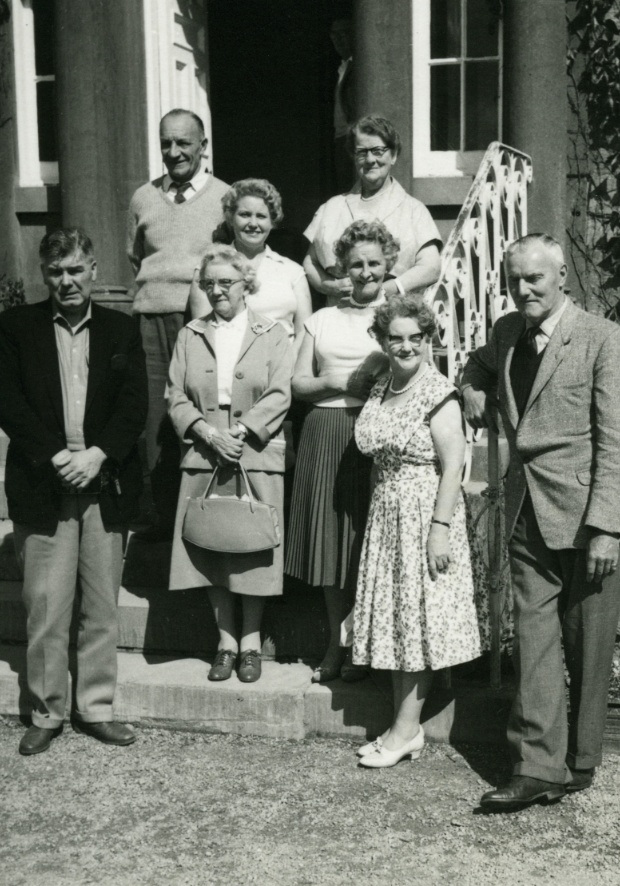
I am searching for an heir
About us
Étude Généalogique Savary has specialized in the search for missing heirs and successors for over 30 years. Our team will help you locate heirs or beneficiaries named in a will, an intestate estate or a trust.

Why call on a genealogist??
No matter what kind or what amount of information you have, we will be able to make the most of it and produce impressive results. Our various resources for research of this type, our contacts throughout the world and the expertise we have developed over the years enable us to achieve a consistent 98% success rate.
Don’t get lost in a research rabbit hole: let us do the searching for you so that you can devote your time to added value work!
They use our services
Notaries
Attorneys
Estate executors
Real estate agents

The steps of our research process - For an intestate estate




Mandate
The administrator of the estate (notary, lawyer or executor) contacts our office to provide us with information and entrust us with the mandate. Gathering information from the administrator and any other persons able to assist us, will determine the course of the research.
Estimated time frame — 2 to 4 weeks






Genealogical research
Our firm’s mandate is to identify the closest relative(s) of the deceased (de cujus). With reference to the estate law that applies to the case, our team will identify these relatives by mapping out the deceased’s genealogy.
Estimated time frame — 1 to 6 months






Tracing down heirs
Once all the potential legal heirs have been identified by the genealogical work, we embark on the second phase of research: locating the heirs.
Estimated time frame — 1 to 3 months






Contacting heirs
The genealogist in charge of the case contacts heirs who have been located and informs them of their potential rights in the estate, their connections with the deceased, the ensuing legal process and their options regarding this process.
Estimated time frame — 1 to 4 months






Preparing documents for settlement
Depending on the case, the jurisdiction
where the estate will be settled, and the assets of the estate,
heirs will be required to complete a number of documents
at different stage of the process. Our team will take
charge of forwarding these documents to the heirs,
providing explanations.
Estimated time frame — 6 months to 2 years






Keeping heirs informed
Throughout the entire time taken to settle the estate,
our team will see to it that heirs are kept informed of the progress and
the timeframes involved.
Estimated time frame — 1 year and more
Recommended remuneration methods
Frequently Asked Questions
Why are you asking me for an I.D.?
When the application is submitted to the notary, he must be able to verify the identity of the heir through a formal document to ensure the validity of his civil status. This can be a copy of your driver’s license, passport or other official document containing your name, date of birth and photograph.
Can you give me the contact details of the other heirs?
We are obliged to keep confidential the information provided to us. However, we will be happy to forward your details or email to other heirs, if you ask us by official correspondence.
Is your company officially registered?
Yes, our company is registered with the Quebec Enterprise Registrar. Our Quebec business number (NEQ) is 1162444294.
Why are estates in France settled by notaries instead of lawyers?
In civil law, notaries have extensive powers that include the preparation of wills, estate matters and property transfers. In France as in Quebec, notaries, among other assignments, are mandated to settle successions. In the US (except in Louisiana) and in the rest of Canada, where the notarial profession does not exist, this task is rather reserved for lawyers. These professionals of the inheritance law appoint us to determine and locate the heirs of a deceased person. Usually, we conduct our research across several countries, and we incur expenses to carry out our mission. The probate genealogist profession is a highly specialized field. We work closely with notaries and lawyers.
What is the process of settling an estate in France?
We do all the necessary research to locate heirs and this regardless of the country in which they are located. As soon as our researches are completed, we provide the notary a certified genealogical chart. The latter can then begin the settlement of the estate. The notary prepares a certificate which includes among others the list of heirs.
Afterwards, the notary can evaluate the active assets (real estate, bank accounts, for example) and passive (current debts such as rent, or money owed to government agencies, for example) of the estate.
In the presence of a real estate, you will be asked for your written consent to put the property for sale. The value is determined by one or many real estate agents. When all the heirs have returned the signed agreements, the property can then be sold on the market. The sale made, the notary calculates estate taxes (for estates in France), pays for the various debts and then shares the remaining assets following the percentage accruing to each heir.
You will receive your net share by check or bank transfer.
Who are the legal heirs on ordinary collateral line?
In such cases, the law stipulates that the estate is divided equally between the maternal line and the paternal line of the deceased.
Can you send me documents that belonged to the deceased?
Most of the time, the personal items are already removed from the deceased home. In order to free the property, furniture and other goods are sold to junk dealers or others, which adds to the assets of the estate. Generally personal papers are destroyed. However, if you inform us as soon as possible, we will try to keep the documents you describe to us.
How long does it take to settle an estate?
Please see the timeframe on the website. However, it is impossible to providean accurate estimate of time, since the settlement is based on many factors such as the number of real estate properties for sale, the number of heirs, the jurisdiction, etc.
What are the assets of the estate?
When we receive the case from the notary or from our colleagues, we have generally only an approximate idea of the constitution of the assets of the estate. For example, that it is composed of a house and bank accounts.
We will not know the exact value of the assets until the case is submitted to the notary, that the settlement of the estate has begun and an inventory has been drafted completely.
The power of attorney you have returned to us, allows us to represent you in front of the notary and take knowledge of the different assets and asset values.
Do not forget that in the event that a liability occurs, if greater than the assets of the estate, you would never have charges or fees to pay, since nothing would be distributed.
Are there inheritance taxes to pay?
In the case of inheritances opened in France (and other European countries) there are indeed inheritance taxes to pay to the government. The rate varies depending on your degree of relationship. There are also duty remissions which are calculated based on the number of children you have. It is therefore very important to complete the civil record questionnaire we send you.
In the case of inheritances opened in Canada, since the 80s, there is no inheritance tax. However, there is a tax on capital gains at time of death. Double taxation is prohibited by international conventions. In the case of inheritances opened in France, the inheritance taxes are paid by the notary to the Department of Revenue, as the amount you receive will be net and you do not have to pay, once again, the rights in your country of residence.
Is it mandatory to completely complete the civil record questionnaire you sent me?
No. However, we must provide the notary a genealogical chart that is conform to reality and this questionnaire allows us to complete or verify the information we have gathered during our researches. This will prevent thereafter to complete documents with incorrect information.
Questionnaire must be fulfilled to the best of your knowledge.





